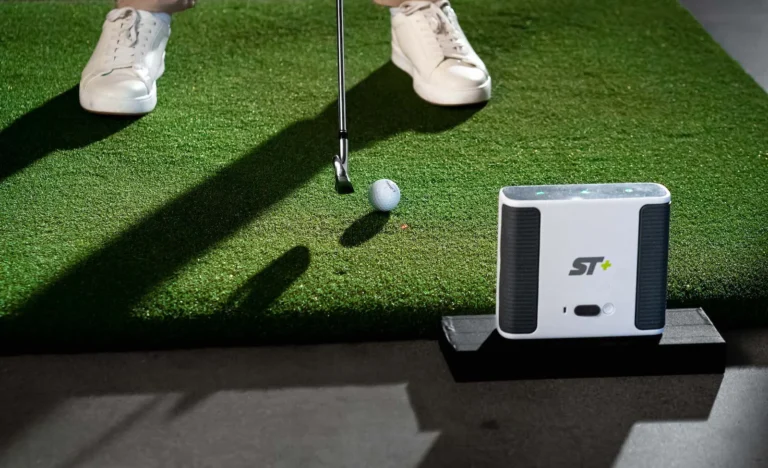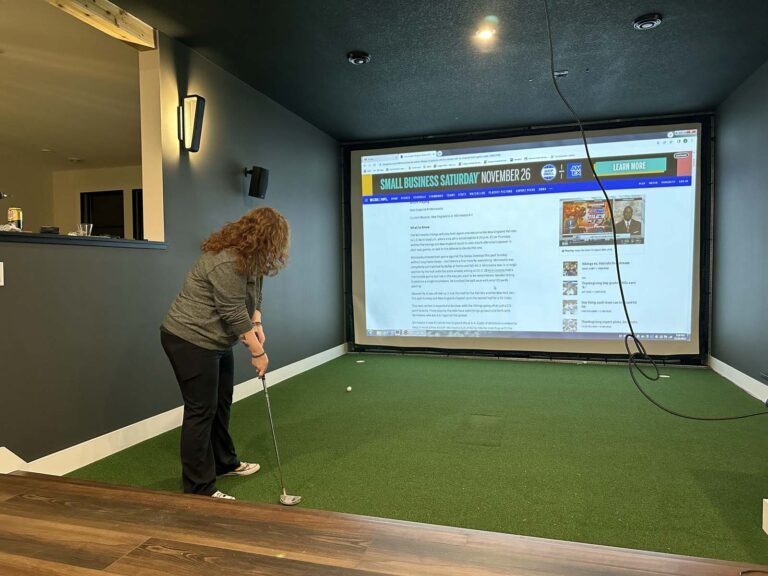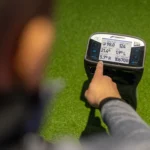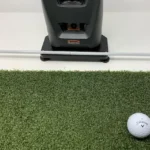So, you’ve got a garage, and you’ve got a golf itch you can’t scratch during the off-season or after work.
A golf simulator in your garage could be the answer to keeping your swing sharp year-round, without the hassle of hitting the links or the driving range.
Let’s face it—practice in the comfort of your own space is unbeatable.
Here’s everything you need to know about picking the best golf simulator for your garage setup.

Benefits of a Garage Golf Simulator
Setting up a golf simulator in your garage is like creating your private practice sanctuary. Imagine rain or shine, day or night, your golf simulator is ready whenever you are. Here’s why it’s a game-changer:
- Year-Round Practice: Never miss a practice day due to weather again.
- Convenient Access: Golfing from home means more time swinging and less time commuting.
- Cost-Effective: Sure, there’s an upfront cost, but when you add up driving range fees and rounds at the course, it’s a solid investment.
Top Golf Simulators for Garage Setups
Let’s dive into some top simulators that fit well into garage setups and give you that “real course” feel right at home.
1. SkyTrak Plus Flex Space Golf Simulator Package

This SkyTrak package is all about maximizing your garage space. With its retractable screen and high-accuracy launch monitor, you can easily switch between practice and other uses for your garage.
- Features: Launch monitor, retractable screen
- Pros: Compact, user-friendly, access to virtual courses
- Cons: Additional software purchase required
- Ideal For: Golfers wanting performance with efficient space usage
- Price Range: $4,599
Perfect for those balancing space and performance, this simulator gives you access to a variety of courses right at home.
2. Foresight Sports GCQuad SwingBay Golf Simulator Package

The GCQuad combines the precision of quadrascopic imaging with the durability of the SwingBay enclosure, offering a top-level experience that’s ideal for the serious golfer.
- Features: Quadrascopic imaging, SwingBay enclosure
- Pros: High precision, sturdy, intuitive software
- Cons: Higher price point
- Ideal For: Dedicated golfers seeking accuracy and detailed analysis
- Price Range: Starting at $19,999
If you’re a golfer who values data accuracy and doesn’t mind investing, the GCQuad brings the feel of a professional setup to your garage.
3. Uneekor EYE XO2 SwingBay Golf Simulator Package

Mounted on the ceiling, the Uneekor EYE XO2 is a sleek option that saves floor space and provides detailed video analysis for your swing.
- Features: Overhead sensor system, Ultra HD video analysis
- Pros: Comprehensive data, minimal floor space use
- Cons: Professional installation may be needed
- Ideal For: Golfers focused on in-depth swing analysis
- Price Range: Around $15,400
This package is a great choice if you’re serious about tracking your swing without sacrificing garage space.
4. Bushnell Launch Pro Garage Simulator

Bushnell’s Launch Pro is a strong mid-range option, balancing quality data and affordability with its high-speed camera system.
- Features: Advanced launch monitor with high-speed cameras
- Pros: Reliable accuracy, value for money
- Cons: Subscription required for advanced features
- Ideal For: Budget-conscious golfers who want professional-grade data
- Price Range: Starts around $4,349
Perfect for those looking to practice on a budget while still receiving accurate and detailed feedback.
5. Uneekor EYE MINI Garage Simulator

The EYE MINI is ideal for those who want a high-quality overhead setup without taking up floor space. Its high-speed cameras are perfect for capturing swing details in limited space.
- Features: Compact, ceiling-mounted high-speed camera system
- Pros: Minimal floor space required, precise data capture
- Cons: Installation can be complex
- Ideal For: Golfers maximizing garage space with quality swing analysis
- Price Range: Around $6,499
With its detailed data capture, this model is ideal for golfers focused on improving their swing mechanics.
6. Foresight Sports GC3 Garage Simulator

Designed for high-level insights, the GC3’s triple-camera setup is a durable option that offers detailed feedback on your swing, making it a top choice for serious garage golfers.
- Features: Triple-camera system for data accuracy
- Pros: Durable, highly accurate
- Cons: Larger footprint for smaller garages
- Ideal For: Intermediate to advanced golfers wanting robust data
- Price Range: Starting at $9,099
This simulator delivers accuracy and quality build, perfect for those who want to dive deep into their practice.
7. Garmin Approach R10 Garage Simulator

The R10 offers a flexible, portable setup that’s compatible with multiple devices, making it a versatile choice for garage or outdoor use.
- Features: Portable launch monitor with advanced metrics
- Pros: Affordable, multi-device compatibility, indoor/outdoor use
- Cons: Limited advanced features
- Ideal For: Budget-friendly golfers needing flexibility
- Price Range: Around $2,599
This compact and budget-friendly option is perfect for golfers seeking easy portability without breaking the bank.
8. FlightScope Mevo+ Garage Simulator

FlightScope’s Mevo+ is a portable simulator that uses Doppler radar technology to capture key data points, making it an affordable and versatile choice.
- Features: Portable launch monitor with Doppler radar
- Pros: Affordable, flexible for garage and outdoor use
- Cons: Fewer advanced features compared to pricier models
- Ideal For: Budget-conscious golfers wanting versatility
- Price Range: Around $3,984
This simulator is great for both indoor and outdoor practice, ideal if you’re looking for flexibility on a budget.
9. Full Swing KIT Garage Simulator

For a realistic, radar-based experience, the Full Swing KIT integrates seamlessly with iOS devices, making it ideal for golfers who want reliable and accurate data.
- Features: Radar-based launch monitor, iOS integration
- Pros: Consistent and accurate data, user-friendly metrics
- Cons: Higher price point
- Ideal For: Golfers seeking precise data and realistic experience
- Price Range: Starts at $6,599
This simulator is geared towards enthusiasts who want advanced data to refine their game at home.
10. TruGolf Launch Box Garage Simulator

The TruGolf Launch Box offers a compact design with advanced simulation software, ideal for smaller garages that still want a robust golf experience.
- Features: Compact launch monitor with high-quality graphics
- Pros: Small footprint, detailed visual feedback
- Cons: Calibration needed for best results
- Ideal For: Golfers needing a small setup with great visuals
- Price Range: Around $4,099
With high-quality graphics and a small footprint, this model is excellent for maximizing garage space.
11. Uneekor EYE MINI LITE Garage Simulator

This compact, high-speed camera system is an excellent solution for tight garages, with detailed swing data for golfers aiming to improve mechanics.
- Features: High-speed camera, minimal floor space requirement
- Pros: Compact, high-quality swing data
- Cons: May require professional installation
- Ideal For: Garage golfers who want accurate data without using floor space
- Price Range: Around $5,599
Ideal for those focused on their swing mechanics in limited space, the EYE MINI LITE offers great data capture in a compact package.
Key Features to Consider
Choosing the right simulator means understanding a few essential features to get the most out of your setup. Here’s what to look for:
1. Accuracy and Realism

- Data Accuracy: Essential for realistic practice; look for simulators that track your ball’s every move.
- Photometric (Camera-Based): Like the SkyTrak, captures high-speed images and is ideal for smaller spaces.
- Radar-Based Systems: Trackman-style systems perform well in larger spaces, but they need more room.
2. Space Requirements

- Ideal Dimensions: Generally, aim for 10 feet wide, 10 feet long, and 9 feet high.
- Ceiling Height: Make sure there’s clearance for your full swing without risking a scrape (or worse).
3. Ease of Installation

- Plug-and-Play Models: Simple and quick, great if you’re not into technical setups.
- Professional Installation: Recommended for more complex systems—ensures everything is calibrated just right.
4. Budget Considerations
- Budget Options: Entry-level models offer the basics and are great for casual practice.
- Premium Setups: Higher-end models with advanced features; ideal if you’re looking to invest long-term.
- Feature Balance: Consider which features matter most—accuracy, space requirements, software compatibility, and your budget.

Space and Setup Requirements
Knowing your garage dimensions and setup needs is key. Here’s a quick breakdown:
Minimum Space Needed
- General Guidelines: Most setups need 10 feet (width) x 10 feet (length) x 9 feet (height).
- Compact Models: Some simulators work well in smaller spaces if your garage is tight.
Ceiling Height Considerations
- Driver Swing Arc: Make sure your ceiling is high enough for a full swing—especially important for tall golfers.
- Adjustable Options: Collapsible simulators work best in lower-ceiling spaces.
Flooring and Wall Protection
- Wall Padding/Netting: Helps shield walls from any stray shots and protects your gear over time.
- Floor Mats: Protects the floor and keeps noise down.

Installation Tips
Step-by-Step Guide
- Prepare Your Garage: Clear out the clutter and measure your space to confirm it matches the simulator’s specs.
- Set Up Components: Position the launch monitor, screen, and netting carefully.
- Calibrate the System: Take a few practice shots to ensure accurate readings and adjust as needed.
Common Challenges and Solutions
- Limited Space: For compact garages, consider retractable setups or simulators that don’t require a screen.
- Lighting Conditions: Too much or too little light can interfere with sensors; indirect or overhead lighting often works best.
- Cable Management: Keep cables organized and out of your swing path—zip ties and cable covers are lifesavers.

Budget-Friendly Options
Affordable Simulators Without Compromising Quality
- OptiShot 2 Golf In A Box: It’s simple but effective—great for casual practice at a fraction of the cost.
- Phigolf Mobile and Home Smart Golf Simulator: Small and portable, ideal for those with limited space or just starting out.
DIY Setup Ideas
Want to save some cash? A basic net and mat paired with an entry-level launch monitor can be a cost-effective way to get started. If you’re handy, consider building a custom enclosure to fit your specific garage space.

Maintenance and Care
Tips to Keep Your Simulator in Top Condition
- Regular Software Updates: These improve accuracy and add new features.
- Clean Sensors and Screens: Dust can interfere with performance; use a microfiber cloth regularly.
- Inspect Hardware: Check for wear and tear to avoid issues down the line.
Common Issues and Troubleshooting
- Calibration Errors: Recalibrate regularly to ensure accuracy.
- Connectivity Problems: If using a Wi-Fi-enabled system, ensure you have a strong connection.
- Inaccurate Shot Readings: Double-check alignment and lighting conditions.
Conclusion
Having a garage golf simulator is like having your private practice range on call. You get to practice whenever you want, whatever the weather, and with today’s technology, these simulators can give you a close-to-real course experience. Evaluate your space, set a budget, and choose the features that matter most to you. Trust me, once you’ve tried it, there’s no going back!
Frequently Asked Questions (FAQs)
What is the ideal ceiling height for a garage golf simulator?
Most simulators need at least 9 feet of clearance for a full swing, though compact setups may require less.
Can I use a golf simulator in a single-car garage?
Yes, but ensure you have enough room for both your setup and your swing path—retractable systems work well in tighter spaces.
How do I ensure the safety of my garage while using a golf simulator?
Protect walls with netting or padding, and use a hitting mat to keep your floors scuff-free.
Are there portable golf simulators suitable for garage use?
Yes, models like Phigolf and OptiShot are portable and ideal for smaller spaces or temporary setups.
What are the ongoing costs associated with maintaining a golf simulator?
Costs may include software updates, occasional hardware replacements, and a subscription for advanced features.








